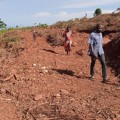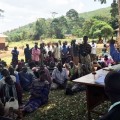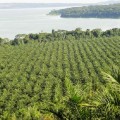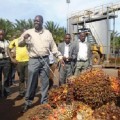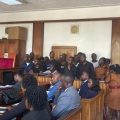By Witness Radio team.
The Buganda Road Chief Magistrate has dismissed another case against 20 anti-EACOP activists due to want of prosecution.
Yesterday, on April 7, 2024, her worship, Jalia Basajjabalaba, dismissed the case against the 20 activists. The case was dismissed after the state failed to produce witnesses pinning the activists on a common nuisance charge after close to 9 months of case trial.
On August 26, 2024, the 20 activists, including Pitua Robert, Okwai Stephen, Kothurach Margret, Omirambe Moses, Owonda Rogers, Alimange Joseph, and Wabiyona Wicklyf, among others, were arrested while peacefully marching to the Ministry of Energy to deliver a petition opposing EACOP and other oil projects. On August 27, 2024, they were arraigned before Court and charged by the Buganda Road Magistrate with common nuisance.
After nearly nine months of trial, the state failed to present a single witness, prompting the magistrate to close the case file.
Although the case against the activists has been dismissed, they remain deeply dissatisfied with the continued pattern of arrests and charges, which often collapse in Court due to a lack of evidence.
Bob Barigye, one of the activists whose case was dismissed, expressed concern over what he described as deliberate attempts to frustrate and silence voices critical of the EACOP project.
“We are saddened that it was just dismissed after eight months of pacing up and down to Court.
We are disappointed that the magistrate did not award us any cost or compensation for the dismissed case, meaning that the state failed to prove that we were a public nuisance and that we were citing violence as activists. Many of us have been forced to travel long distances from our villages to attend court sessions in Kampala — only for the state to produce no evidence against us. It’s a clear waste of our time, energy, and resources. But beyond that, it’s an attempt to discourage us from speaking the truth about the dangers of the EACOP project,” Barigye said.
Barigye added that the activists are already engaging their lawyers to explore further legal remedies in higher courts, demonstrating their unwavering commitment to justice and their cause.
“It is frustrating and deeply disappointing that we are dragged to Court and disrespected every time we stand up against this deadly pipeline, the East African Crude Oil Pipeline (EACOP). But we were ready to face this battle in Court because we knew we had committed no crime by delivering a petition,” Barigye said, expressing the activists’ exasperation with the legal process.
Shortly after their last Court appearance on February 20, the 20 accused activists, during a press briefing, demanded that the judiciary stop delaying hearings of their case related to the EACOP project and called for the dismissal of their case if the Court lacks sufficient evidence to prosecute them.
“The courts of law should not be used as tools of oppression. They should not waste any time. If we have a case to answer, let them prosecute us on April 7, which they have scheduled. If they fail again, they should dismiss the case instead of wasting our time and resources,” the activists emphasized, reiterating their demand for a fair and expedited legal process.
This is the second milestone achieved by the Stop EACOP activists in less than two months in their continued campaign against the EACOP pipeline. In February 2025, the Court also dismissed a common nuisance case against the 15 EACOP activists due to the lack of prosecution.
“The state doesn’t present a single witness in all the cases that have always been preferred against us. No witnesses have come along to say that these people were unruly. As activists, we want to investigate this further and go to the Constitutional Court to learn what constitutes a nuisance. Whoever is demonstrating peacefully is arrested and charged with a public nuisance. This charge is coronial and very demeaning. We want to go ahead and challenge this,” Barigye revealed, outlining the activists’ proactive plans to challenge the charge of public nuisance.
The EACOP project has long been controversial, with environmental activists arguing that it poses a significant environmental risk and has already left a trail of human rights abuses in the communities hosting it in Uganda and Tanzania.
The EACOP is a 1,443-kilometer heated pipeline transporting crude oil from Hoima, Uganda, to Tanga, Tanzania. The first 296 kilometers run through Uganda, while the remaining 1,147 kilometers pass through Tanzania. The project is a joint venture between TotalEnergies, the Uganda National Oil Company (UNOC), the Tanzania Petroleum Development Corporation (TPDC), and the China National Offshore Oil Corporation (CNOOC).
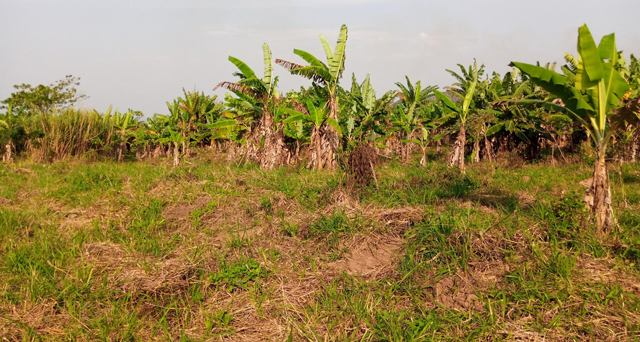

 SPECIAL REPORTS AND PROJECTS1 week ago
SPECIAL REPORTS AND PROJECTS1 week ago
 NGO WORK2 weeks ago
NGO WORK2 weeks ago
 SPECIAL REPORTS AND PROJECTS4 days ago
SPECIAL REPORTS AND PROJECTS4 days ago
 MEDIA FOR CHANGE NETWORK4 days ago
MEDIA FOR CHANGE NETWORK4 days ago
